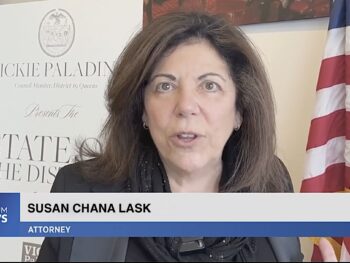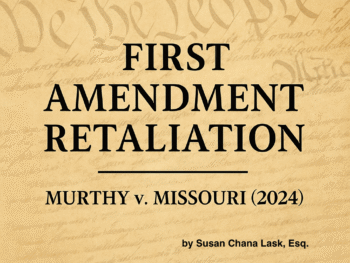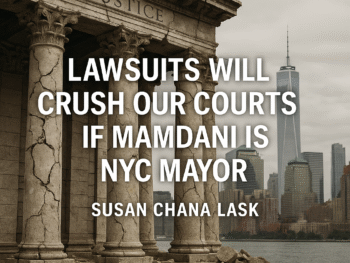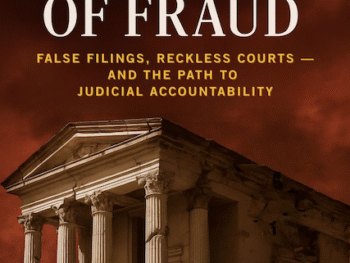00-9000
To be argued by
Susan Chana Lask, Esq.
___________________________________________________________________________
____________________________________________________________________________
UNITED STATES COURT OF APPEALS
for the
SECOND CIRCUIT
_____________________________
JOHNNY WILDER,
Plaintiff-Appellant,
-against-
GL BUS LINES, INTERNATIONAL BUS SERVICES, INC. &
TRANSPORT WORKERS UNION OF AMERICA, LOCAL 225,
Defendants-Appellees.
______________________________________
ON APPEAL FROM THE UNITED STATES DISTRICT COURT
FOR THE SOUTHERN DISTRICT OF NEW YORK
APPELLANTS’ REPLY BRIEF
LAW OFFICES OF SUSAN CHANA LASK
Attorneys for Petitioner-Appellant
853 Broadway, Suite 1516
New York, NY 10003
212/358-5762
TABLE OF CONTENTS
Page No.
ARGUMENT……………………………………………………………………………………………………………….. 1
I. Defendant-Appellee GL Misrepresents in its Brief the Import of the
Exxon Case as the Facts in Exxon and Its Holding Actually Supports
Plaintiff-Appellant’s Position that Clear and Specific Notice of a No
Tolerance Drug Policy and its Consequences is Required to be Given
to an Employee before an Employee can be Terminated…………………………………………………………………………………………………. 1
A. Appellees’ Arguments that the CBA Clearly Referenced a Drug Free Policy and
Plaintiff-Appellant had Knowledge of that is a Clear Misrepresentation and were
the Same Misrepresentations that Confused the Lower Court and Resulted in
Lower Court Relying on Facts that Did No
Exist………………………………………………………………………………………………… 2
B. Defendant-Union’s Failure to Notify its Members, including Plaintiff, of the Employer’s
Zero Tolerance Drug Policy when the Union Admittedly Possessed Such Detailed
Information of the Employer is a Breach of its Duty of Fair
Representation………………………………………………………………………………….. 4
II. The Lower Court’s Own Statements in its Opinion and Order and on the
Record in this Case Reflect Its Dissatisfaction with The Defendant
Union’s Supposed Investigation and Representation of Plaintiff-
Appellant’s Termination Case and With the relevant case law, Wherein
the Lower Court Had a Hard Time Accepting Whether the Union Fairly Represented Plaintiff Appellant…………………………………………………………….. 5
A. Cases Exemplify the Fact that Union’s Do Take Positive Drug Test Matters to
Arbitration and Save the Employee from Losing His Job…………………………………… 5
III. Defendant-Appellee Union’s Arguments that the Court Below Properly
Granted it’s Motion and Fees Were Properly Assessed Against
Plaintiff’s Attorney Not Only Both Fail as Argued in Plaintiff-
Appellant’s Brief, But Both Arguments Are Waived and Must be Ignored
by this Court As they Violate Fed. R.App. P. 28(b)……………………………… 7
A. Plaintiff-Appellant Stands Corrected as to its Citation to Farmer on Page 13 of its
Brief ……………………………………………………………
CONCLUSION……………………………………………………………………………… 8
TABLE OF AUTHORIITIES
CASES CITED PAGE(S)
Boritzer v. Blum, 1985 WL 25022 (E.D.N.Y., 1985)…………………………………….. 8
Eastern Assoc. Coal Corp. V. United Mine Workers of America, 121 S. Ct. 464 (2000)… 6
Ernst Haas Studio, 164 F.3d at 112 (USCA, 2d Cir., 1999)……………………………………….. 7
Exxon Corp v. Esso Worker’s Union, Inc., 118 F.3d 841 (1st Cir. 1997)………….. 1,2,6
Farmer v. Arabian American Oil Co., 324 F.2d 359 (2d Cir., 1963)………………. 8
In re Southern California Gas Co. & Utility Workers Union Of America, Local 132, AFLCIO,
89 LA (BNA) 393; 89 Lab. Arb. (BNA) 393 (1987)……………………………………… 6,7
Langman Fabrics v. Graff, et. Al., 160 F.3d 106 (USCA 2d Cir, 1998)……………………… 3,4
Moore v. Time Inc. 180 F.3d 463 (USCA, 2d Cir, 1999)……………………………………….. 7
NLRB v. Local 282, et.al, 740 F.2d 141 (USCA, 2d Cir., 1984)………………………………. 4
Pepsi-Cola Albany Bottling Co. v. Int’l Brotherhood of Teamsters, (N.D.N.Y., 1998)…….. 7
Santiago vs, Greyhound Lines, Inc., et.al., 956 F. Supp 144 (1997)……………… 6
Statutes & Rules
Fed. R.App. P. 28(b)…………………………………………………………..
REPLY BRIEF OF APPELLANT
ARGUMENT
I. Defendant-Appellee GL Misrepresents in its Brief the Import of the Exxon Case as the Facts in Exxon and Its Holding Actually Supports Plaintiff-Appellant’s Position that Clear and Specific Notice of a No Tolerance Drug Policy and its Consequences is Required to be Given to an Employee before an Employee can be Terminated
Defendant-Appellees, GL Bus Lines and International Bus Services, Inc. (collectively referred to as “GL”), Brief, at pages 24-27, argues that an employer can terminate an employee based on its Zero Tolerance Drug Policy when an employee tests positive and uses Exxon Corp v. Esso Worker’s Union, Inc., 118 F.3d 841 (1st Cir. 1997) to support that argument; but GL ignores the most important fact of notice established in Exxon, by making its argument appear that Exxon stands for an absolute right of termination, without bringing to this Court’s attention the fact that notice was a major factor in that case. Exxon involved a Union CBA that stated the employer’s very specific and detailed no tolerance drug policy, including its consequences of terminating employees who tested positive for drugs. The 1st Circuit Court of Appeals in that case was very careful to note numerous times throughout its decision the fact that Exxon’s no tolerance drug policy was included in the CBA and “an appendix to the CBA catalogs the posted offenses”, Exxon “implemented a comprehensive drug free workplace program (the DFW program), “…embodied in a formal policy statement”, “… made the program’s terms available to all employees”, “…the program puts Exxon’s work force on notice of the company’s intention…”, Exxon required employees to sign statements attesting they had notice of Exxon’s zero tolerance drug policy, and so forth. Such specifics indicates that Appellate Court’s satisfaction with the fact that the employer provided notice to its employees and the employees had actual notice of a very specific and detailed termination policy if an employee tested positive for drugs. Therefore, if GL wants to use Exxon to support its argument that an employee can be terminated based on a Zero Drug Tolerance Policy, then GL must prove to this Court that it, just as the employer in Exxon had a very specific and detailed drug policy that put the employee, Plaintiff-Appellant herein, on notice of termination and there was proof by a signed receipt from Plaintiff-Appellant that he received such notice. By all means an employer has the right to terminate an employee who tests positive for drugs; however, as addressed in our Brief, GL gave no notice of its termination policy as required by federal law to Plaintiff-Appellant, its termination was wrongful as the logic in the Exxon case cited by Defendant-Appellee supports “notice” and “knowledge” of such a policy before termination.
A. Appellees’ Arguments that the CBA Clearly Referenced a Drug Free Policy and Plaintiff-Appellant had Knowledge of that is a Clear Misrepresentation and were the Same Misrepresentations that Confused the Lower Court and Resulted in the Lower Court Relying on Facts that Did Not Exist
The CBA has one sentence that simply states “All lecturers, Driver (sic) and Outdoor Ticket Agents will be required to comply with the Company Drug Free Work Place Policy”. (A81; GL’s Brief at page 29). Nothing more is stated in that sentence or anywhere else in the CBA. The CBA violated the import of the Exxon case, wherein a specific, detailed and clear policy and its consequences should be stated so the employee would have notice of just what a Drug Free Work Place Policy means and its consequences of termination or rehabilitation. The Exxon case involved an employee who had knowledge of what that Court described as a “comprehensive” policy; facts that did not exist in this case as Plaintiff herein had no knowledge an Defendant-Appellee did nothing to notify Plaintiff of any such policy. In the instant case, no Drug Free Work Place Policy was in effect because GL never noticed its employees of it, GL and the Union never specified it in the CBA and GL does not deny in its Brief that it could not produce a signed receipt of its policy (GL’s Brief at page 23).
Unfortunately, the Lower Court relied upon and became confused with this same misrepresentation of Defendant-Appellee, GL, holding, without any legal or factual support, that despite Plaintiff never receiving the actual copy of GL’s policy that since Plaintiff possessed the CBA containing that one sentence then he had actual notice “that employees were subject to immediate discharge for violation of GL Bus Lines’ policy.” (A377). Nowhere does the CBA state that “employees were subject to immediate discharge for violation of GL Bus Lines’ policy.” The Lower Court created facts that did not exist.
GL also wrongfully argues at page 29 of its Brief that Plaintiff-Appellant admitted his knowledge of the policy during his deposition at the following page references: A302-03 at pp 32:22-33:16; 34:12-14; A317-18 at pp. 88:21-89:2; A326 at pp.125:24-127:23 (the Defendant-Appellee Union makes the same misrepresentations throughout its Brief, specifically page 9, without citing any reference to the Record); however, that is just not true. GL’s counsel asked Plaintiff very vague and unspecific questions regarding his knowledge of GL’s Zero Tolerance Drug Policy. Upon reading his deposition responses, it is clear that he did not understand at all what the policy was until the day he was terminated. Also, GL’s counsel never pinned him down to a time or date at his deposition. Plaintiff’s responses were as follows: “Drugs, zero policy, something like that” (A316 at p. 88:21-25) or he testified he thought the policy meant he had to take a drug test at work (A302 at p. 33:6-9). Plaintiff clearly responded at his deposition that he first knew of such a policy when he was terminated. Plaintiff never testified that he knew of the policy before his termination date, no such question was asked of him, and he in fact testified in his Affidavit (A239) that he never knew of such a policy, as well as no employee knew of such a policy because GL never notified them of it (A:248, at para. 8). The Lower Court noted also that Plaintiff’s responses at the deposition did not “sound like he was being responsive”. A357 at page 19:4-5.
Because of the non-specific, confusing and ambiguous questions asked by GL’s counsel at the deposition and the fact that Plaintiff did not understand the questions because he never knew of such a policy, Plaintiff’s subsequent Affidavit was submitted to explain that he did not know of such a policy during his employment. That affidavit should have been accepted by the Lower Court as disputing and explaining Plaintiff’s prior sworn testimony pursuant to Langman Fabrics v. Graff, et. Al., 160 F.3d 106 (USCA 2d Cir, 1998), not ignored. (A377); especially in face of the fact that the Lower Court noted Plaintiff was non responsive at his deposition. A357,supra.
B. Defendant-Union’s Failure to Notify its Members, including Plaintiff, of the Employer’s Zero Tolerance Drug Policy when the Union Admittedly Possessed Such Detailed Information of the Employer is a Breach of its Duty of Fair Representation
Appellees’ Briefs constantly misrepresent that Plaintiff had knowledge of the Zero Tolerance Drug Policy of GL. Such steadfast misrepresentations by Appellees demand attention as to the reason why Defendant-Appellees are compelled to create facts that do not exist. One reason would be to negate the fact that the Union breached its duty of fair representation to the Plaintiff-Appellant. The fact is that there was absolutely no notice in the CBA or to Plaintiff-Appellant that a Zero Tolerance Drug Policy existed and that it mandated termination and this Court has recognized in NLRB v. Local 282, et.al, 740 F.2d 141 (USCA, 2d Cir., 1984) that a a breach of duty of fair representation existed when a union failed to notify its members of terms that affected their right to employment. This Court stated in NLRB that the union was obligated to ensure that its members received notice of terms that affected their employment, which included termination consequences. This Court must follow the same logic as in NLRB as the Defendant-Appellee Union here failed to notify Plaintiff-Appellant of the terms of the Zero Drug Tolerance Policy and its consequences of termination of his employment. Furthermore, knowing he had no such notice and the Union being in possession of that policy yet failing to distribute it to its employees, ( See A.118-119, where Union President Greulich’s Affidavit states the Union had the policy and receipt forms for employees to sign, yet can not provide Plaintiff’s signed Receipt Form nor states the policy was distributed to employees; also see GL’s Brief, pp. 21-22 wherein it admits the Union had the policy but again can not state said policy was distributed to employees, specifically Plaintiff), results in the Union breaching its duty of fair representation, then compounding the breach by failing to defend Plaintiff’s rights they failed to notify him of, then again breaching its duty of fair representation by performing a less than negligible “investigation” of Plaintiff’s case.
II. The Lower Court’s Own Statements in its Opinion and Order and on the Record in this Case Reflect Its Dissatisfaction with The Defendant Union’s Supposed Investigation and Representation of Plaintiff-Appellant’s Termination Case and With the relevant case law, Wherein the Lower Court Had a Hard Time Accepting Whether the Union Fairly Represented Plaintiff-Appellant
As much as both Appellees herein state in their Briefs that a full investigation by the Union was completed and that satisfied the Union’s duty of fair representation, that is just not true. Even the Lower Court expressed throughout this case its dissatisfaction with the Union’s investigation and representation of Plaintiff’s case. In response to the Union’s counsel’s statement that the Union has a right to determine whether a grievance was meritorious, the Lower Court stated “That does not mean they have a right willy-nilly….they essentially talked to a couple of doctors, the president, and said we do not want anything to do with this operation. That was the end of their contribution.”, A.43-44 at pp. 3-4:18-5, and in its Decision and Order, stating, “I agree with Plaintiff that Local 225 could conceivably have done more to investigate the circumstances surrounding the urine test at issue.” A.372. With respect to the law of breach of duty of fair representation, the Court stated, “…the arbitrary, discriminatory and bad faith touchstones are pretty hard to pin on them (meaning the Union)”, A.56 at p. 16:3-15, and “I am clear that the case law is at least, from the little I have here, interpretable any way you want to interpret it…” A.61 at p. 21:19-21. The Lower Court obviously had a hard time grappling with the facts and law in this case, wherein it actually based its decision on the same misrepresentations of fact presented by Appellees Briefs as they did so in the Lower Court (see argument I.A. Hereinabove), creating facts that just did not exist.
A. Cases Exemplify the Fact that Union’s Do Take Positive Drug Test Matters to Arbitration and Save the Employee from Losing His Job
The Appellees herein argue that the Union did not have to take Plaintiff’s case to Arbitration. This was not a case of a temporary suspension from work or an imposition of fines that had to be paid by Plaintiff to the employer. In those instances, denying Arbitration would appear reasonable; however, this case involved the permanent termination of Plaintiff from his job and the stigma of being labeled a drug abuser when he flatly denied drug use. It was unreasonable for the Union to deny Plaintiff his chance before an impartial arbitrator when his livelihood and reputation were at stake. Cases throughout the country, involving similar facts and even cases in the extreme where employees admitted to being drug users in face of the employer’s zero tolerance policy, resulted in union’s going to arbitration and obtaining reinstatement for the employee and referral to a substance abuse professional (“SAP”).
A union in Eastern Assoc. Coal Corp. V. United Mine Workers of America, 121 S. Ct. 464 (2000), a case cited in Defendant-Appellee’s, GL, Brief, took an employee driver’s case not once but twice to arbitration when that employee twice failed random drug tests at a safety sensitive job. The arbitrator in Eastern found each time that the employee could be reinstated to his job upon certain conditions, including referral to a Substance Abuse Professional (“SAP”). Note also that the Supreme Court stated in Eastern that rehabilitation is critical under the Omnibus Transportation Employee Testing Act of 1991 and the DOT Regulations enforcing it and specifically stated that 49 C.F.R. 382.605(b) mandates a driver to be seen by an SAP (which supports Plaintiff’-Appellant’s arguments in its Brief). In Exxon, another of Defendant-Appellee’s, GL, cited cases, the facts illustrate the union there took the employee’s case to arbitration three times in face of a drug free workplace policy and three times the union obtained reinstatement and rehabilitation for the employee. In Santiago vs, Greyhound Lines, Inc., et.al., 956 F. Supp 144 (1997), the District Court found that a Union displayed “considerable diligence” for the member whose urine tested positive for drugs as it actually obtained an offer of reinstatement and back-pay for the terminated member. In the present case, Plaintiff received no such diligence from Defendant-Appellee Union. In In re Southern California Gas Co. & Utility Workers Union Of America, Local 132, AFLCIO, 89 LA (BNA) 393; 89 Lab. Arb. (BNA) 393 (1987) the union defended its member whose urine tested positive for drugs by taking his case to arbitration, challenging the testimony of the employer’s expert, introducing their own expert testimony and even bringing out the fact, (as should have been done in this case) that certain procedures were not followed by the employer, resulting in the Union obtaining the employee’s job back. In Pepsi-Cola Albany Bottling Co. v. Int’l Brotherhood of Teamsters, (N.D.N.Y., 1998), although it may not appear factually on point, it certainly indicates a union’s diligence to its members by taking a case to arbitration to interpret its CBA provisions regarding termination and obtaining reinstatement of an employee who failed a drug urine test. Taking Plaintiff’s case to arbitration would have given Plaintiff a fighting chance for his job, especially in light of so many wrongs under Federal Law and as committed by Defendant-Appellee Union by just failing to notify Plaintiff of the employer’s drug policy, as discussed here and in Plaintiff-Appellant’s Brief.
III. Defendant-Appellee Union’s Arguments that the Court Below Properly Granted it’s Motion and Fees Were Properly Assessed Against Plaintiff’s Attorney Not Only Both Fail as Argued in Plaintiff-Appellant’s Brief, But Both Arguments Are Waived and Must be Ignored by this Court as they Violate Fed. R.App. P. 28(b)
Fed. R.App. P. 28(b) mandates an Appellee’s Brief contain arguments supported by citations to the authorities, statutes, and parts of the record relied upon. Moore v. Time Inc. 180 F.3d 463 (USCA, 2d Cir, 1999); Ernst Haas Studio, 164 F.3d at 112 (USCA, 2d Cir., 1999). Defendant-Appellee’s, Union, arguments that its late Summary Judgment was properly granted and fees were properly assessed against Plaintiff-Appellant’s counsel, in its Brief at pages 10-12, rest on bald assertions, without any supporting case law and or facts; thus, such arguments fail according to this Court in Moore. Additionally both the Union and Defendant-Appellee, GL, do not controvert in any way the cases supporting Plaintiff-Appellant’s arguments in its Brief that the Union’s motion should not have been granted as it was unfair to do so when it was late as well as costs can not be granted against Plaintiff’s counsel personally; therefore, Plaintiff-Appellant’s arguments on those grounds are uncontroverted by Appellees and should be granted.
A. Plaintiff-Appellant Stands Corrected as to its Citation to Farmer on Page 13 of its Brief
Defendant-Appellee GL has brought to our attention that Farmer was cited on page 13 of Plaintiff-Appellant’s Brief in a context that did not make sense. In fact, Farmer was mistakenly cited on that page and the sentence should delete any reference to Farmer, reading as follows:
“A District Court may impose costs personally against an attorney only under 28 USC §
1927, even though no explicit reference is made to that statute in the District Court’s
opinion. Boritzer v. Blum, 1985 WL 25022 (E.D.N.Y., 1985). The Boritzer court noted
that Rule 54(d) should be read in combination with 28 USC § 1927.”
CONCLUSION
For the forgoing reasons, Plaintiff-Appellant and Joint-Appellant both respectfully request that this Court vacate the Judgment of the District Court, dated July 14, 2000, remand this case to that court for trial and dismiss costs or costs should be dismissed as against the attorney for
plaintiff personally as a matter of law and grant such other and further relief as this Court deems just and proper.
Dated: New York, New York
February 7, 2001
Respectfully submitted,
Law Offices of Susan Chana Lask
_______________________________
By: Susan Chana Lask, Esq. (scl-1744)
853 Broadway, Suite 1516
New York, NY 10003
(212) 358-5762
Attorney for Plaintiff-Appellant









